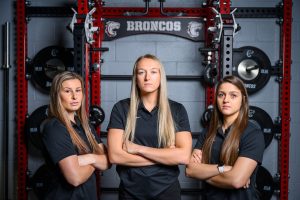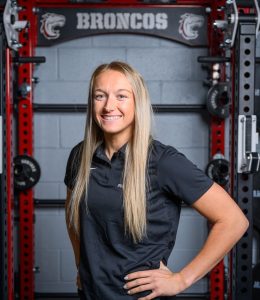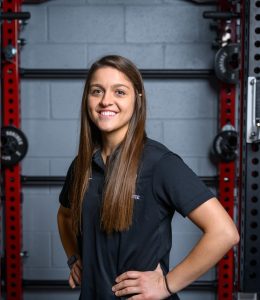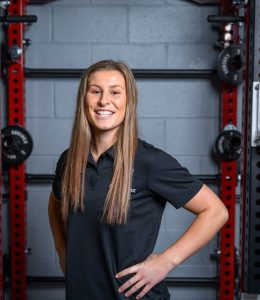
On Monday mornings at 5:00 a.m. most people are fast asleep, getting their last few hours of rest before starting another week of work. Human Performance coaches, however, are not most people. Also referred to under the title of “Strength & Conditioning,” Human Performance coaches most days are the first ones into the building and the last to leave — sometimes by choice, but most of the time because of facility limitations and scheduling conflicts.
It is a young, energetic profession traditionally fueled by meat-heads and macho-men alike. Oftentimes, the Human Performance coach takes on various roles that stretch far beyond the scope of the weight room, such as being a motivational speaker, mentor and therapist for athletes.
On any given day, if someone had the opportunity to visit every collegiate weight room in the state of Nebraska, the athletic weight room in Hastings College’s Lynn Farrell Arena would stand out — not because of its equipment or the athletes that lift there, but because of the Broncos’ Human Performance staff.
Currently in the state of Nebraska there are only five female collegiate Human Performance coaches — and three coach at Hastings College. Their names are Shandra Farmer ’20, Ally Ginkens ’20 and Cassidy Dyhrkopp, and all second-year graduate assistants with the Broncos working with Brett Wells, the director of Human Performance and 2019 NSCA Nebraska Collegiate Strength & Conditioning Coach of the Year.
A fourth female Strength & Conditioning coach in Nebraska, Laura Buttermore, is an assistant coach with the University of Nebraska at Omaha (UNO). Before UNO, Buttermore coached from 2012 to 2018 in the weight room at Hastings College. This means 80 percent of the female collegiate strength coaches in the state of Nebraska have coached at Hastings College in the last three years.
Hooked on Human Performance

Ginkens, who majored in Exercise Science and Recreation & Sport Management, played volleyball at Hastings College and was a member of the 2016 National Championship squad. The former team captain became interested in Human Performance when she first started working out in the Broncos’ weight room and began to see improvements in the performance of her teammates and herself.
“When I came to Hastings it was very obvious which freshmen had experience in the weight room and came from a high school that had a strength coach because they were progressing so much faster than players like me who had to start our progress from the ground up due to our technique being wrong from never having anybody to coach us on that before college,” Ginkens explained. “I was watching all my teammates making huge strides forward, while I was moving backward. So when I adjusted to the technique and began to see huge improvements I got hooked on human performance and what it could do for myself and others.”
Ginkens made the weight room her home when right before her senior season she received the news that former Broncos head volleyball coach Matt Buttermore was moving on to become the head volleyball coach at UNO.
“As a senior the last thing you want to do is start over and it felt like everything we knew had been erased,” Ginkens said. “It was a new culture, new lifestyle, new everything with a new coach and I just really found a home in the weight room where that culture remained the same despite everything in my world that was changing. It held everyone to a high standard and that was really what I clung to. It was a great place for me to exemplify leadership and hard work because it was something that I knew. It was familiar in a time where everything was changing.”
This sense of belonging and drive to become better inspired Ginkens to become a graduate assistant of Human Performance at Hastings College where she now coaches women’s basketball, men’s and women’s tennis, shotgun sports and football in the weight room.
Finding another path

Farmer is also a Bronco alumni and decorated graduate of the Hastings College women’s basketball team. As an athlete, Farmer received many honors on the court, including being named First-Team All-Conference her junior and senior years, and as a senior she was named First-Team All-American, the Great Plains Athletic Conference Player of the Year and the Omaha World Herald’s Midland Co-Female Athlete of the Year in addition to being a team captain.
Farmer, who studied business administration and human resource management as an undergrad, never considered the possibility of coaching until questions about her future in athletics became a consistent theme during her senior season.
“I had planned to earn a Masters of Business Administration somewhere else, get a business job and use my degree,” Farmer said. “But my senior year, after having a really successful season, I had been approached by multiple people about the possibility of coaching. So it got me thinking that if other people are seeing me as a good leader and having a way of being able to speak to people and help them out, maybe I do need to stay around sports. So this opportunity came up with coach Wells and the Human Performance staff and I took it right away.”
In order to receive the foundational knowledge needed to coach Human Performance, Farmer set out to preparing for the Certified Strength & Conditioning Specialist (CSCS) exam through the National Strength & Conditioning Association (NSCA), and got enrolled in the United States of America Weightlifting (USAW) Level 1 coaching course with Ginkens and Dyhrkopp.
She now coaches the Broncos’ softball, men’s basketball and football teams in the weight room while attending University of Nebraska at Kearney (UNK) to earn an MBA with an emphasis in Human Resources. Her dream is to utilize the combination of her coaching experience and business background to become an athletic director or other form of administrator within an athletic department so she can make the most of her education and stay around sports.

Unlike Ginkens and Farmer, Dyhrkopp did not attend Hastings College as an undergraduate, but joined the Broncos’ Human Performance staff after coming highly recommended by her strength and conditioning coaches at UNK, where she ran track as a sprinter and competed in the long jump and triple jump events.
Dyhrkopp became highly involved in the Lopers’ weight room after seeing the positive results that strength and conditioning had on her performance as an athlete.
“In high school, I never really had a strength program. We just had the football coach who taught weights class,” Dyhrkopp said. “So when I got to college I had the best strength coaches I’ve ever had and actually saw myself improve in my sport and just life in general. That’s when it really clicked for me mentally about how much that relationship with the strength coach makes a difference and how much you can accomplish when you buy-in to what they’re doing.”
Dyhrkopp currently coaches the Broncos’ volleyball, men’s and women’s wrestling and football teams in the weight room. Her goal is to be a Human Performance coach, either at the collegiate level or in the private sector working with athletes. She has even entertained the idea of owning her own performance center one day.
Building relationships, growing confidence
When asked about what their favorite part of coaching is, Ginkens, Farmer and Dyhrkopp immediately came to a consensus: relationships.
“One of my favorite things is creating relationships, not just with my athletes but all the athletes in general and just getting to know them more than just as a player or as an athlete,” Dyhrkopp said. “Getting to build those relationships and watch them progress is so meaningful.”
Farmer added, “I just love having the connections and interactions every single day with other people. Being able to see the athletes and be around people who love playing their sport and want to be there; it’s amazing.”
But as great of a profession as coaching is, these grad assistants still experience plenty of struggle in their day-to-day coaching activities.
Ginkens pointed out that confidence is one of the most important attributes of being a coach, but it’s a trait that doesn’t come easy.
“Just as a young coach, you get questioned a lot,” Ginkens said. “Like, if I was five years older people would not even question things, but since I’m a young coach I feel questioned a lot about what I’m doing. So that can have an effect on developing confidence, because if you’re always being questioned about what you’re doing, you start to question yourself.”
For Dyhrkopp, her biggest struggle has been coming face to face with the realization that coaching is a lot more than just X’s and O’s and having lots of sports knowledge.
“When I first became a coach I thought the hardest part would be programming workouts and those other things that I didn’t have any experience doing, which of course was difficult at first,” Dyhrkopp said. “But what I didn’t expect was having to coach more than just technique; things like effort, body language and culture. When you become a college coach, nobody tells you that you’re going to spend most of your time coaching and managing attitude and effort. I assumed college athletes already had those things taken care of, but I learned differently very quickly.”
Dealing with stereotypes
On top of developing their identities as coaches, these women have also dealt with facing the stereotypes and assumptions that come with being females working in a male-dominated industry.
“It’s a struggle dealing with the social media influencer stereotype,” Ginkens said. “People think females in the fitness industry are only there to teach people how to develop their glutes and come up with all these 10-minute band workouts and things like that. People just don’t see females actually coaching athletic teams.”
Farmer said personal trainers and social media influencers have their place and do a lot of good. “But when that is the majority of what people see from females in the industry it just becomes much harder to be taken seriously when coaching with the goal of athletic performance,” she said.
They attribute these stereotypes to a large-scale issue in the realm of Human Performance by sharing: part of the problem is that the field is just over-saturated with unqualified people who are portrayed as personal trainers or specialists.
“That’s a huge reason why we’re seen as different in this setting,” Dyhrkopp said. “Because us as females have also portrayed ourselves this way. We have to get people to see that we can be the smart, sport scientist style of coach as well, not just the model or social media influencer.”
Despite the challenges, these coaches have taken an active role in battling biases and assumptions by proving their merit through their own coaching demonstrations and personal workouts.
“People can doubt our weight room abilities because we’re female, but it’s always funny when the athletes see us doing advanced weightlifting movements and get surprised at how good we are at them,” said Ginkens.
“I always think it’s funny when our athletes or other coaches walk by the weight room and see us working out and lifting heavy, then all of a sudden we get a lot more credibility,” Farmer said. “We are no longer seen as girls who are just there to clean up the weight room after sessions. But, it’s not until they see that we know what we’re doing when we finally get that response and respect.”
They’ve also seen these biases and assumptions leave the weight room and leak into professional interactions.
“One struggle I’ve specifically had is male coaches being nervous about working around a female every day. I’ve had guys feel that they don’t want me around because of ideas like ‘you shouldn’t cuss around a female’,” Farmer said. “People are raised to respect women and that is a great thing. However, when the ideology that men need to act or talk differently around females creates more barriers for women in the workplace, it becomes an issue that should be discussed. That’s just how it’s been for so long and if we don’t talk about it, it becomes this systemic cycle.”
On the opposite end of things, Gingens said she’s struggled with coaches specifically hiring someone because they are female.
“It’s like — no — I want to be the absolute best candidate you have, not the best female candidate you have,” Gingens said. “I don’t want to be hired because I’m a female. It’s just something I’ve struggled with. When I apply for jobs I’m starting to question: are you hiring me because you actually like my work ethic and what I have to offer as a coach? Or is it because I’m a female and I have some good qualities, but mainly it’s because you need to hire a female? I just want to be the best for the position.”
Building a better profession
Despite the struggle, these women are working through it, hoping to create a better coaching profession and advance the field of Human Performance through their efforts.
“People always talk about how this industry is male-dominated and you never really see females in it,” said Farmer. “The phrase I always come back to is ‘if not us, then who?’ If females don’t start doing this job, then we won’t progress or get anywhere in it. We are starting to see more females get into the industry. The change is starting to be made and it’s pretty cool that we get to be a part of it.”
Dyhrkopp said she fully embraces her role as a Human Performance coach and has complete pride in what she’s doing.
“We’re just out here making moves for everyone else,” Dyhrkopp said. “Now that I’ve taken the step to be a female Human Performance coach, whenever I’m looking at jobs or internship opportunities I always look to see if they have female coaches. That’s something that is just so awesome. And if you look around, you do start to see more and more females in coaching and that is just so cool.
“The positives we get are the same positives as any other coach who is benefiting their athletes. We’re here to do the same thing as them. But the added positive of it is that we’re helping to pave the way for other females in the future. However, we strive for the same things as any other strength coach.”
Ginkens said she believes the whole industry itself is making a big change.
“A strength coach in 10 years is no longer going to be portrayed as this huge meat-head, screaming and yelling at athletes,” she said. “And I think part of this change is females making their way into the industry. And I’m glad we’re going to be a part of it. If we keep going in the right direction it’s just a matter of time before having a female strength coach isn’t special, it’s just normal.”
When asked what advice she would give to other females who dream about working in Human Performance, Ginkens said “Go for it. It’s not going to be easy and you’re going to have to be tough. But just go for it.”
Farmer’s advice is to trust yourself.
“Know who you are and what you want to do, and don’t let people who don’t agree with it or don’t like you make you doubt yourself,” she said. “Do qualified work by growing through critique and disagreement, but don’t let it break you completely. Take the opportunity to put yourself in positions that you normally wouldn’t, so when your opportunity does come you’re ready for it.”
Farmer, Dyhrkopp and Ginkens have elevated the Hastings College Human Performance program above any previous level. They bring intelligent work, accountability, vulnerability and goodwill to an athletic department that consistently reaps the benefits of their intentional efforts. Every day these women are working toward building a better world of athletics, and hope to spark the minds of others who wish to do the same.

